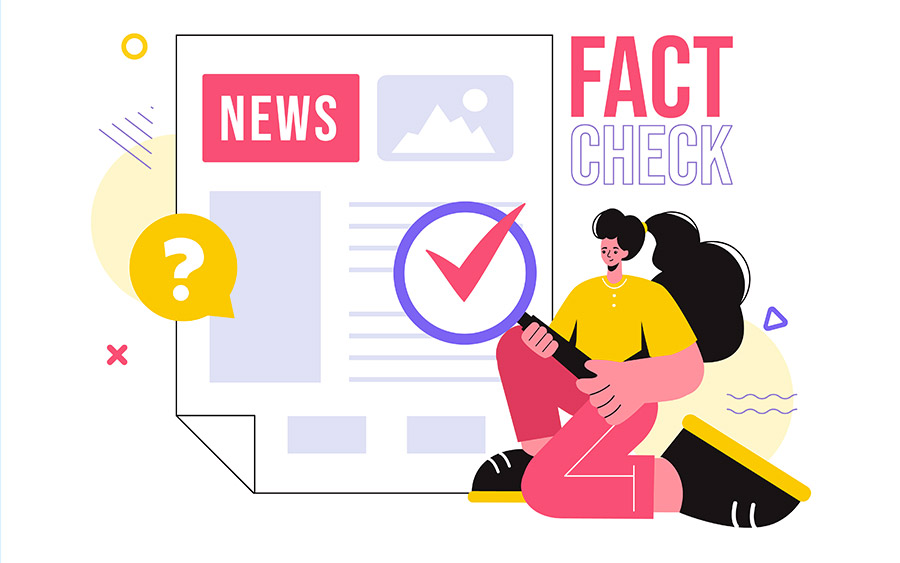Fact-checking: the essential ally of your communication strategy
Fact-checking is the systematic verification of the accuracy of information or a statement, in order to fight against disinformation and promote the reliability of content.

In a world where trust is essential, fact-checking becomes a key step in ensuring the credibility of your content. But in concrete terms, how can we ensure that reliable information is disseminated? We explain everything to you.
Why is fact-checking crucial for your business?
False information can be funny… until it destroys your credibility.
In an ultra-connected world, where information travels at the speed of light, mistakes can have serious consequences. A study[1] shows that false information can seriously affect a company’s reputation , making it vulnerable to public criticism and distrust.
Fact-checking then becomes a valuable weapon to avoid bad buzz and build trust in your content.
Indeed, fact-checking is essential to protect your brand from possible accusations of inaccuracies or dishonesty, but it is also a strategic lever for maintaining consistent and reliable communication.
It allows you to remain credible in the face of increasingly vigilant competitors.
What is Fact-checking?
Fact-checking is the process of verifying the accuracy of information.
This practice concerns figures, quotes, photos and technical data. Clearly, everything that may be questionable must be scrutinized.
Fact-checking example
A textile company recently published an article announcing that its new product is made with “100% organic cotton.” Soon after, wary consumers discovered through extensive research that some batches included synthetic fibers.
Result? An avalanche of criticism on social networks and a press release of apology to try to restore the brand’s image.
If fact-checking had been applied, this blunder could have been avoided.
This is the challenge of fact-checking: to anticipate problems before they turn into bad buzz and to preserve your credibility. Whether it’s to verify a simple statistic or analyze the source of an image, this step is a real guarantee for your reputation.
Why is fact-checking vital for your communication strategy?
Fact-checking is much more than just a tool: it is a necessity in today’s hyperconnected world.
Indeed, information circulates quickly and on a large scale, especially via social networks. A simple misattributed number or an erroneous quote can damage a company’s image and destroy months of work.
Fact-checking therefore becomes an indispensable shield to prevent these embarrassing errors.
Rigorous communication:
- inspires confidence,
- builds loyalty among your audience,
- and strengthens your position in the market.
How to integrate fact-checking into your daily life?
Cross-reference sources
One source is not enough. Multiply the points of view, check the numbers on reliable sites and compare the information.
Official databases, research institutes and recognized sources are your best allies.
Adopt the right tools
Many free or paid tools facilitate fact-checking:
- Google Fact Check Explorer : perfect for verifying information in a few clicks;
- TinEye or Google Images : ideal for verifying the authenticity of a photo;
- Dataminr : to follow the news in real time and verify its origin.
Involve your team
Fact-checking is not the preserve of one person.
Educate your marketing or communications team about the importance of fact-checking. The more integrated it is into your processes, the more reliable your content will be.
Avoid reputational mistakes
An error can have important consequences, such as a misattributed citation or an erroneous statistic.
Let’s take the example of a company that publishes a “flagship” statistic on its website, but forgets to mention the source of it. The lack of transparency could lead to a loss of trust, especially if other sources contradict this information.
Inspire trust in your audience
In a digital jungle saturated with fake news, solid and reliable information makes all the difference.
Factual content builds your credibility and audience loyalty. For example, a brand that regularly publishes studies and research validated by experts will inspire more trust than one that is satisfied with slogans or vague figures.
Your audience is looking for authentic and reliable content, and by offering that, you’ll build their loyalty.
Earn points against your competitors
A company that communicates with precision and professionalism stands out in its market.
Let’s take the case of a company that, in addition to guaranteeing verified information, communicates on how it carries out its verifications. This becomes an additional argument for differentiation in the face of less transparent competitors.
The quality of the information you share can become a real competitive advantage, provided you have rigorous processes in place.
In conclusion, fact-checking is a winning habit!
Fact-checking is not a constraint; It’s a strategic investment that pays off in the long run.
In a world where information flows at lightning speed and consumer opinions can be built in an instant, it becomes crucial to master the accuracy of the information you share.
A company that takes care to guarantee the veracity of its content is not only protecting its image; It builds a relationship of trust with its customers and partners.
This trust is the key to loyalty, a precious commodity that is much more difficult to regain once lost.
Fact-checking thus becomes a pillar on which you can base your company’s communication strategy, while displaying transparency that will be perceived positively by your audience.
Beyond immediate credibility, this practice also creates a solid foundation for the future. By being rigorous about the veracity of your information, you position your company as a serious, responsible player who cares about the integrity of its messages.
This allows you to avoid missteps that could tarnish your reputation and also puts you in a favorable position against your competitors, who might not take the same precautions.
Fact-checking therefore becomes a real asset in building a robust and trustworthy brand image.
Consumers, more informed than ever, are increasingly turning to brands they believe to be reliable and transparent. Therefore, investing in fact-checking also means investing in a more effective, sustainable and respected communication strategy.
[1] Fake news: a growing challenge for companies, Viavoice.